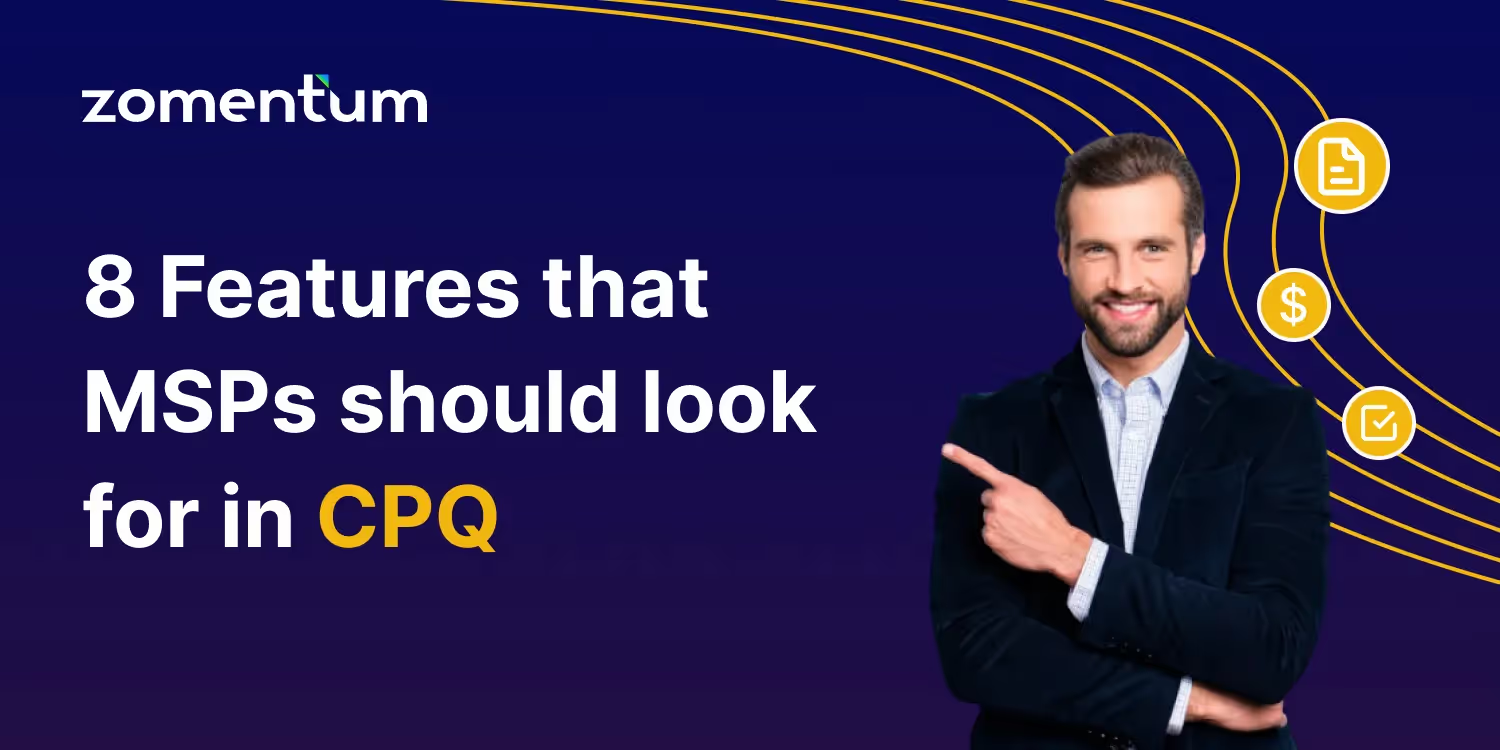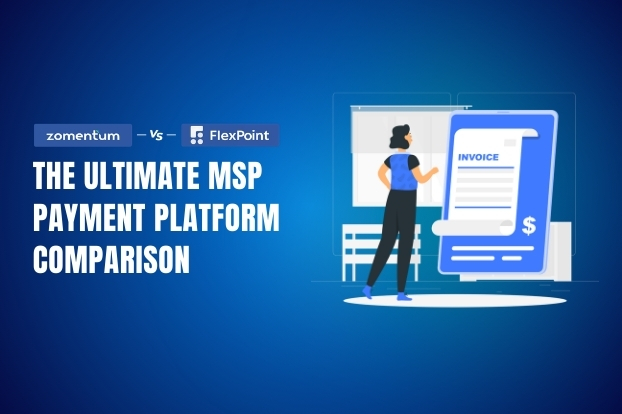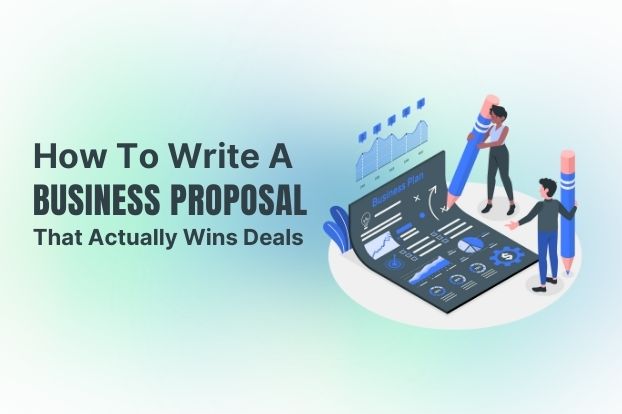8 Features that MSPs should look for in CPQ

If you are an IT Partner, MSP, MSSP, VAR, chances are, more than often, you may not have the bandwidth to exclusively focus on the MSP sales process or business development. Your teams are already involved in your core business operations— monitoring, refining, or repairing the existing clients’ IT infrastructures. Even if they do have some free time, it is more likely (and should be) spent on strengthening client relationships and helping SMBs view your company as a partner that’s interested in helping them succeed.
Enter CPQ. Automation tools such as CPQ (configure, price, quote) can help you automate a part of your sales process. CPQ software can help you:
- build buyer relationships,
- quote accurately,
- reduce revenue leakage from your sales pipeline,
- integrate with your existing distributors, vendors, and product catalog, and
- generate important metrics to use for the continual improvement of your quoting processes.
But does your business need CPQ software? It’s a fair question. You’re probably using a PSA and a CRM — why add another tool to your sales process?
To determine if your business needs CPQ, ask yourself the following questions:
- Does your MSP catalog include complex products with complicated pricing models?
- Are your sales reps losing revenue by sending out incorrect configurations and pricing?
- Are you still using spreadsheets and word documents to build your proposals?
- Is someone from your team manually reviewing all your quotes before sending them out?
If you answered “Yes” to most of those questions, it’s time for you to start considering CPQ solution.
Read more: How to build a modern Quoting Process for your MSP Business with CPQ
What to look for when buying CPQ
CPQ software helps companies automate configuring products, pricing, and generating quotes for the customer. If you’re evaluating CPQ, here are some tips you should keep in mind.
1. Does the basic job - configure, price, quote
The first and foremost thing you should look out for in CPQ is that it does basic activities that are part of the configure, price, quote process: configuration logic for your products, standard and custom pricing, and quote building, signing, and tracking.
2. Suits your business budget
This is one of the most important questions to ask before you invest in CPQ. Is it affordable? Are you actually paying for the features that you need? Always look for CPQ that meets your exact requirements and can work both when you have a lean sales team and when you want to scale your operations in the long term.
3. Simple and easy to use
Look for a simple CPQ software platform that is easy to set up. Most importantly lookout for automation within proposal and quote building capabilities. The easier it is to create personalized quotes, contracts, and other sales materials, the faster the adoption across your sales teams, the more useful the software.
Also, make sure the platform is easy to use, can be understood in two trial/training sessions, and can be used by multiple sales reps with ease.
4. Integrates seamlessly with other Software
Integrations are important for business efficiency and helping your systems talk to each other. They also ensure consistent client experience, which reflects well on you and your business. CPQ should seamlessly integrate with other tools in your business.
This includes tools both within and outside of sales, like customer relationship management, marketing, etc. Most MSPs typically have a PSA or a CRM which stores your customer information and product description. Look for integrations with these tools when you’re opting for CPQ.
Another important feature when it comes to Managed IT services is Distributor integrations and price catalogs. They show the latest product and service catalog and real-time pricing for all IT products. These integrations are important to quickly configure new products and add pricing information to your quotes. However, only a few vendors have exclusive integrations with these tools. When choosing the right CPQ, make sure you look for these integrations without fail.
Another common feature to look out for in CPQ software is online payment integration. This gives you the ability to collect payments online when you send the quote to your customer. Ensure that your CPQ can connect to your choice of payment gateway.
5. Eliminates sales communication delays
The quicker your sales team can send out a quote, the faster they can uncover and overcome any objections and, if all goes well, close the deal. Constructing a successful proposal in the least amount of time is crucial. Make sure your CPQ software works in a matter of minutes instead of hours. Also, ensure it allows clients to raise questions and ask for clarifications through comments in real-time.
6. Provides secure and legally binding E-signature
As an IT Partner, it is often tiresome to switch between multiple software and deal with countless email threads for simple signature approval.
Check if your chosen CPQ solution has integrated and legally binding E-signature. Electronic signatures are coded and encrypted for an added layer of security. It ensures that the electronic document has been signed by the person in question and that there has not been any tampering within the document. With E-signatures inbuilt in the proposals, your customers can automatically accept and sign proposals basis specified acceptance terms.
7. Spins off reports for easy analysis
Once the deal has been closed, you will need to analyze your process to drive more sales in the future. Ensure your CPQ has a strong reporting and analytics feature. Some CPQ software use funnel charts to visualize what types of quotes or proposals will be successful. This data can be used to draft proposals that win more deals with the least amount of time and effort.
Watch now: How Can MSPs Drive Incremental Revenue from their Existing Clients
8. Supports your business journey
When you’ve listed a set of potential options, check out the support capabilities they provide.
- What does the support look like?
- Does your potential option offer free onboarding support?
- Do they help with free quotes and proposal templates?
- Do they have a community of MSP and IT channel partners who may run into the same problems as you?
- Who are their existing customers? Have they run into some problems with the software?
Another important tip is to ask around for advice in your fellow MSP community. The MSP community is strong, close-knit, and collaborative. Leverage it to reach out to consultants, industry experts, and peer groups that can help you navigate this technology transition.
Above all, when going for any software, evaluate it for the real value it provides to your business. A perfect tool works silently in the background, automating your sales process allowing you to focus on your customers, their problems, and adding that human touch to sales.
An end-to-end sales acceleration platform like Zomentum replaces a patchwork of integrated tools to give you ONE platform for sales funnel management, CPQ, and sales automation. Our intuitive IT CPQ toolset helps you configure pricing, quote contracts, and gain instant approvals with secure and legally binding e-signature. Zomentum customers on average close deals 2X faster, see a 6X increase in average deal size, and spend 70% less time on drafting and sending proposals. Contact Zomentum today and we’ll show you how to replicate these numbers for your business.
Suggested Blogs
.jpg)
10 Best Quoting Software Tools for MSPs and IT Service Providers

FlexPoint vs Zomentum Payments: The Ultimate MSP Payment Platform Comparison for 2026

